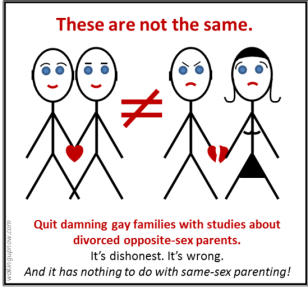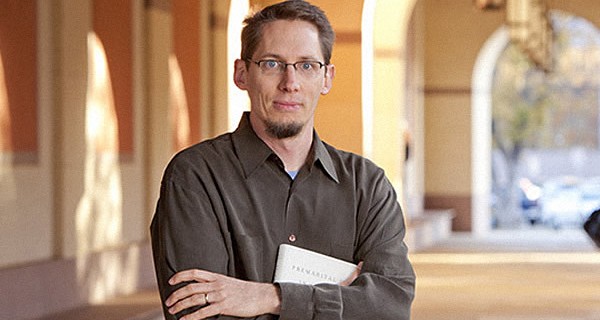Remember Mark Regnerus’ “family structure” “study” that tried to investigate whether or not there was really a difference between gay and straight parents? Remember how fucked up that study was and how it didn’t even clearly define sexual orientation, but instead asked adults whether their parents had ever had a same-sex relationship or encounter? Then a bunch of other researchers got pissed about the study? Then the journal that originally published the study did an internal audit and found the whole thing to be bullshit? Now, in a new interview, Regnerus has said, “I take pains in the study to say this is not about saying gay or lesbian parents are inherently bad” and basically claims the study isn’t about gay parenting at all.
This roller coaster has been fun for all of us, hasn’t it? I think it was the most fun for the National Organization for Marriage (NOM), who jumped right on the study as scientific proof that gay and lesbian parents make terrible parents — just what they were after! Finally, scientific evidence in support of their bigoted ideals! Maybe they’d finally have a legitimate study to reference, unlike that one about conversion therapy.

via The Daily Beast
Last Friday, Regnerus, perhaps prompted by the hundreds of researchers who have called him out on his skewed methodology, told CitizenLink, a Focus on the Family affiliate, that while he stands behind his findings, he regrets his word choice: “I said ‘lesbian mothers’ and ‘gay fathers,’ when in fact, I don’t know about their sexual orientation.” That because participants in the study were asked whether or not their parents ever had same-sex relations, not if they were gay or straight. It seems like someone never learned the difference between experiences and identity.
In Regnerus’ study, he writes in the abstract,
“I compare how the young-adult children of a parent who has had a same-sex romantic relationship fare on 40 different social, emotional, and relational outcome variables when com-pared with six other family-of-origin types. The results reveal numerous, consistent differences, especially between the children of women who have had a lesbian relationship and those with still-married (heterosexual) biological parents.”

via Waking Up Now
Lest you start wondering what these differences between children of women who have had lesbian relationships and those with married heterosexual parents actually are, I’m here to tell you to stop worrying about the potential harm you might cause to your present or future children. Out of all of these women who have had lesbian relationships, only two were actually raising children together.
“…a lot of people who were critics of mine will say: ‘Yeah, we know that, obviously, family structure matters,’ and then they’ll complain, ‘Why didn’t you find many stably coupled lesbians?’ Well, they just were not that common in the nationally representative population. There were two cases where they said the mom and her partner lived together for 18 years. There was another several who lived together for 15 or 13 years. So, stability in the sense of long-term was not common.
While what he’s suggesting is that gay couples don’t stay together long-term, his interpretation of the data is suspect. What was the last peer-reviewed study that you saw that only found 2 stable lesbian relationships out of a sample size of 248 same-sex relationships? Something here is just not quite right. And while he sees the data as indicative of problems with same-sex relationships, it appears that what he’s really looking at are the differences between still-married heterosexual biological parents and parents who have had same-sex affairs. Are these actually comparable? That’s like comparing married biological parents to parents in unstable marriages or divorced parents but labelling the latter group “gay and lesbian parents.” What we have here is a study that proves absolutely zero about the outcomes of gay and lesbian parenting.
We’ve talked at length on Autostraddle about the all problems in the study, ranging from the socioeconomic implications of the study to the historical significance of asking adult children of parents who have had same-sex relationships in a time when many gay men and lesbians felt safer in sham marriages. What changes now that Regnerus claims his study isn’t about parenting at all?
NOM and Focus on the Family have never been that worried about scientific facts, so I’m not sure Regnerus saying “This isn’t about gay and lesbian parents being inherently bad” will change anything and certainly won’t stop them from using the study as a foundation for their opinions.
What Regnerus has done with his study is harmful. The methodology and assessments lead people to believe that gay and lesbian parents are inadequate when compared to heterosexual parents, despite the fact that virtually no gay or lesbian parents were studied, a fact that Regnerus admits himself. Perhaps Regnerus is attempting to regain some credibility within the academic community, but to me, it seems a little too late. By continuing to stand by his findings even though negligent word choice has brought around harmful assumptions gay and lesbian parents, he’s mislabelling unstable heterosexual relationships as a problem within our community.
One interesting development in the “Are gays terrible parents?” saga is a new study that actually does focus on gay and lesbians as parents. Adopted children in heterosexual and gay households were evaluated after two months, one year, and two years in their new homes. Of the 82 children studied, 22 were placed in households with gay and lesbian parents. The study found absolutely no difference between the children placed with heterosexual parents and the children placed with gay and lesbian parents, “despite gay and lesbian parents raising children with higher levels of biological and environmental risks prior to adoptive placement.”
At the end of the interview, CitizenLink says to Regnerus, “It often seems that the academy is becoming very politicized on this issue, much like the mainstream media — if you don’t subscribe to a particular worldview, you are a heretic.” You know, I can’t help but think I’ve heard that somewhere before.









Comments
Really interesting, especially in light of the adoption study and this:
http://www.queerty.com/study-lesbians-make-great-parents-world-is-round-20121101/
I’m glad that he clarified his methodology, though I agree that it won’t make a difference to NOM and Focus on the Family. They’ll always see what they want to see.
This is especially enraging because Mark Regnerus is my Sociology professor here at the University of Texas at Austin. I thought this university would know better to detach themselves from negative people on their campus. As a queer person, it’s very unsettling to arrive in a class knowing that the person teaching you has done things like this.
Cross your finger I make it through this semester, y’all.
Does it make me a bad person to wish I were in your shoes? I’ve been looking for a good reason to explode on someone.
All the same, finger’s crossed and rainbow stickers stuck!
Oh great. I just started here (though in a totally different field). Still always great to see your home base funding bad, bullshit, or harmful research.
Not that all research-oriented universities aren’t guilty of some dark shit.
You should go talk to him about the study.
If you are open to being interviewed about your experience at UT, I want to hear from you. newyorkcitywriter@earthlink.net I report on the Regnerus scandal for http://www.TheNewCivilRightsMovement.com
Soooo, thanks for making me pissed. JK, but I need to read that study. Also, if he skews his word choice, I’m sure he skewed his sample and his findings. Additionally, perhaps the children of the parents who had same sex experiences were screwed because their parents screwing the same sex. As in, set aside all the fluid parents who “explored,” it wouldn’t be surprising if this guy managed to find a whole crew of folks who dabbled in same sex intimacy, were convinced they were hellions for it, and went on to head themselves and thus ineffectively raise their children. Just sayin’.
I can’t edit? Ugh.
So, screwed up kids because their parents WEREN’T screwing the same sex.
Also, went on to HATE themselves…
Oh, typos.
The thing that makes this even more irritating is that, yeah, he says his study doesn’t say that, but the seed of the idea has already been planted. It’s really fucking irresponsible to put out studies like this that perpetuate stereotypes and then try and recall them later when people call you out on your bullshit. This crap perpetuates itself, another dubious study gets put out and then the entire area needs more research because no one is really quite sure what the truth of the matter is. And that just leaves more room for shitty studies. You’d think that someone who studied sociology would be a bit more aware of that. It’s crap like this that makes people question us all the time and puts us on the defensive, not anything actually legit.
The study design was intentionally booby-trapped against gays. A man named Brad Wilcox, Director of the Witherspoon Institute’s Program for Family, Marriage and Democracy recruited Regnerus to do the study, and then collaborated with him on the study design. Here are some of Wilcox’s additional conflicts of interest in this, that were not voluntarily disclosed, and which I unearthed through my investigations: 1) Wilcox — an old crony to Regnerus and to “Social Science Research” journal editor James Wright, who published the study — is on the editorial board of that journal; 2) Wilcox’s University of Virginia programs receive financing from both of Regnerus’s funders; Witherspoon, and The Bradley Foundation; 3) Wilcox additionally collaborated with Regnerus on data collection, data analysis and interpretation; 4) a preponderance of evidence shows that Wilcox was permitted to do peer review.
In his published study, Regnerus lies by saying that the funders were not involved with study design, et cetera. “Social Science Research” editor James Wright now has published Regnerus’s “Additional Analyses” which repeat the lie. He says “No funding agency representatives were consulted about study design, et cetera” I saw an advance copy of the new article. I sent editor James Wright an e-mail as a reporter. I showed him all the evidence that his editorial board member Brad Wilcox was involved — as Witherspoon’s Program Director — in study design. Wright ignored my e-mail, and published Regnerus’s lie for the second time anyway.
The publishing company that owns the journal, Elsevier, has James Wright assigned as Editor-in-Chief of its upcoming International Encyclopedia of Social and Behavioral Sciences. And, the anti-gay religious right-wing knows it can make end runs around legitimate peer review to get gay-bashing hate speech “studies” published through Wright. Michael Schwartz, Chair of the Department of Sociology at Stony Brook University is calling for the Regnerus study to be retracted from publication and for James Wright to be fired as an editor.
In Regnerus published study, Regnerus says that the question his study is answering is this: “Do the children of gay and lesbian parents look comparable to those of their heterosexual counterparts?” So for him now to say that he doesn’t know whether his study subjects parents are gay or lesbian makes him look like even more of a gay-bashing bigot asshole than he did before.
[…] http://develop.autostraddle.com/regnerus-family-structure-study-wasnt-about-same-sex-parents-after-all-1…. ↩ […]
Just desire to say your article is as amazing. The clearness to your publish is simply cool and i
could think you’re knowledgeable on this subject.
Well along with your permission allow me to snatch your
feed to keep updated with coming near near post.
Thank you 1,000,000 and please keep up the enjoyable work.
I really like looking through a post that will make people think.
Also, thank you for allowing for me to comment!
Spot on with this write-up, I truly think this amazing site
needs a lot more attention. I’ll probably be back again to read through more, thanks for
the info!
Good info. Lucky me I ran across your website by accident (stumbleupon).
I’ve book-marked it for later!
My partner and I stumbled over here fromm a different web page
and thought I might as well check things out.I like what I see so now i am following you.
Look forward to finding out about your web page repeatedly.
Thanks to my father who told me about this blog, this webpage
is genuinely awesome.